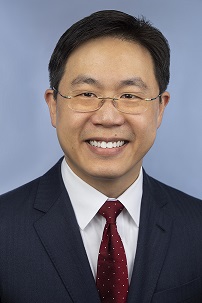Victor Huang, M.D.

Compassionate care centered on the patient experience is at the center of my personal mission. There are some conditions that are easily diagnosed and treated, and others that are complicated and chronic. In either case, my goal is to guide each patient through their personal journey by leveraging my own training and experience as well as the resources available via my regional, national, and international colleagues.
Title
Health Sciences Associate Professor
Dr. Huang has a special clinical interest in vitiligo, an autoimmune depigmenting condition of the skin, and inflammatory conditions of the skin. He also maintains an interest in drug reactions related to cancer therapies, and is the Director of Phototherapy at UC Davis Health.
Research/Academic Interests
Dr. Huang's research focuses on the clinical, epidemiologic, and translational understanding of vitiligo, an autoimmune condition of the skin. To that end, he has established collaborations to investigate novel technologies for the evaluation and treatment of vitiligo, and has been involved with clinical trials. In addition, he is active in understanding dermatologic sequellae of cytotoxic chemotherapies and targeted therapies used to treat cancer.
Education
UC San Francisco School of Medicine, San Francisco CA 2008
Internship: Internal Medicine, University of Chicago, Chicago IL 2008-2009
Residency: Dermatology, Washington University in St. Louis, St. Louis MO 2009-2012
Fellowship: Dermatology, Brigham and Women's Hospital, Boston MA 2012-2014
Professional Memberships
American Academy of Dermatology
Honor and Awards
Academic Dermatology Leadership Program American Academy of Dermatology, 2016
EADV Educational FellowshipEuropean Academy of Dermatology and Venereology
NIH Loan Repayment Program World Congress Travel Fellowship Society for Investigative Dermatology Scholarship for Excellent Academic
Achievement North American Taiwanese Medical Association, 2011
Selected Recent Peer-reviewed Publications:
Huang V, Lonsdorf AS, Fang L, Kakinuma T, Lee VC, Cha E, Zhang H, Nagao K, Zaleska M, Olszewski WL, Hwang ST. Cutting edge: rapid accumulation of epidermal CCL27 in skin-draining lymph nodes following topical application of a contact sensitizer recruits CCR10-expressing T cells. J Immunol. 2008 May 15;180(10):6462-6.
Watanabe R, Gehad A, Yang C, Scott LL, Teague JE, Schlapbach C, Elco CP, Huang V, Matos TR, Kupper TS, Clark RA. Human skin is protected by four functionally and phenotypically discrete populations of resident and recirculating memory T cells. Sci Transl Med. 2015 Mar 18;7(279):279ra39.
Wu PA, Huang V, Bigby ME. Interventions for mycosis fungoides: critical commentary on a Cochrane Systematic Review. Br J Dermatol. 2014 May;170(5):1015-20.
Dowlatshahi M, Huang V, Gehad AE, Jiang Y, Calarese A, Teague JE, Dorosario AA, Cheng J, Nghiem P, Schanbacher CF, Thakuria M, Schmults CD, Wang LC, Clark RA. Tumor-specific T cells in human Merkel cell carcinomas: a possible role for Tregs and T-cell exhaustion in reducing T-cell responses. J Invest Dermatol. 2013 Jul;133(7):1879-89.
Gupta M, Huang V, Linette G, Cornelius L. Unusual complication of vemurafenib treatment of metastatic melanoma: exacerbation of acantholytic dyskeratosis complicated by Kaposi varicelliform eruption. Arch Dermatol. 2012 Aug;148(8):966-8.
Huang V, Hepper D, Anadkat M, Cornelius L. Cutaneous toxic effects associated with vemurafenib and inhibition of the BRAF pathway. Arch Dermatol. 2012 May;148(5):628-33.
